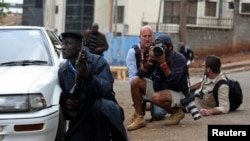The chairman of Kenya’s National Cohesion and Integration Commission (NCIC) says his organization has launched a nationwide media campaign to ease tensions between various communities.
The move follows week-end terrorist attack on a popular shopping mall in the capital, Nairobi, killing over 60 people. Al-Shaba, a Somalia-based hardline Islamic group, has claimed responsibility.
Mzalendo Kibunjia says the new sensitization program comes after some Kenyans demanded the expulsion of Somali refugees.
“That tells you the kind of tension that is likely to happen in subsequent days unless some intervention or some outreach work is done by the commission and other people of goodwill to Kenya,” said Kibunjia.
He says the NCIC faces a stiff challenge in carry out its mandate following the terrorist assault on the Westgate shopping mall.
“Definitely because of this attack it has made our work difficult, and I say that with the experience we’ve had previously when we had some attacks in Eastleigh, which is a suburb of Nairobi [with a high concentration of Somalis],” said Kibunjia. “It took a lot of outreach to tell Kenyans that crimes are not committed by tribes, clans or regions but they are committed by individuals. So definitely, yes our work will be difficult.”
Some observers have expressed concern that Kenyans of Somali origin or Somali refugees could face reprisals. But, Kibunjia says his group aims to change that view.
“As a commission we need to begin [activities that promote] healing, reconciliation and cohesion. [We must try] to tell Kenyans that although we have indigenous Somalis in Kenya, it doesn’t mean that they are a part and parcel of the small element of Somali-Somalis committing these heinous crimes in Kenya,” said Kibunjia. “It’s very important to be proactive to make sure that those tensions don’t begin.”
Kibunjia says the NCIC will continue with its work despite the difficulty it faces due to the rising tensions between ethnic groups.
“We are developing radio messages, and we have already asked some of the media departments to begin developing messages that can go on the radio so that those tensions are lessened before they escalate,” said Kibunjia. “There are also some who are coming up saying ‘please let us hold together, this is an international attack,’ and I think that message is also beginning to sink [in].”
Kibunjia called for the Kenyans to come together in light of the attacks.
“We have been on this road before, but our unity is what made us to pull through this process. I would want to give, for example, the way Kenyans have responded by donating blood and money to help some of the families that have suffered,” said Kibunjia. “That same spirit that we show when we are under attack, is that same spirit that should prevail as we go through this process.”
The move follows week-end terrorist attack on a popular shopping mall in the capital, Nairobi, killing over 60 people. Al-Shaba, a Somalia-based hardline Islamic group, has claimed responsibility.
Mzalendo Kibunjia says the new sensitization program comes after some Kenyans demanded the expulsion of Somali refugees.
“That tells you the kind of tension that is likely to happen in subsequent days unless some intervention or some outreach work is done by the commission and other people of goodwill to Kenya,” said Kibunjia.
He says the NCIC faces a stiff challenge in carry out its mandate following the terrorist assault on the Westgate shopping mall.
“Definitely because of this attack it has made our work difficult, and I say that with the experience we’ve had previously when we had some attacks in Eastleigh, which is a suburb of Nairobi [with a high concentration of Somalis],” said Kibunjia. “It took a lot of outreach to tell Kenyans that crimes are not committed by tribes, clans or regions but they are committed by individuals. So definitely, yes our work will be difficult.”
Some observers have expressed concern that Kenyans of Somali origin or Somali refugees could face reprisals. But, Kibunjia says his group aims to change that view.
“As a commission we need to begin [activities that promote] healing, reconciliation and cohesion. [We must try] to tell Kenyans that although we have indigenous Somalis in Kenya, it doesn’t mean that they are a part and parcel of the small element of Somali-Somalis committing these heinous crimes in Kenya,” said Kibunjia. “It’s very important to be proactive to make sure that those tensions don’t begin.”
Kibunjia says the NCIC will continue with its work despite the difficulty it faces due to the rising tensions between ethnic groups.
“We are developing radio messages, and we have already asked some of the media departments to begin developing messages that can go on the radio so that those tensions are lessened before they escalate,” said Kibunjia. “There are also some who are coming up saying ‘please let us hold together, this is an international attack,’ and I think that message is also beginning to sink [in].”
Kibunjia called for the Kenyans to come together in light of the attacks.
“We have been on this road before, but our unity is what made us to pull through this process. I would want to give, for example, the way Kenyans have responded by donating blood and money to help some of the families that have suffered,” said Kibunjia. “That same spirit that we show when we are under attack, is that same spirit that should prevail as we go through this process.”










